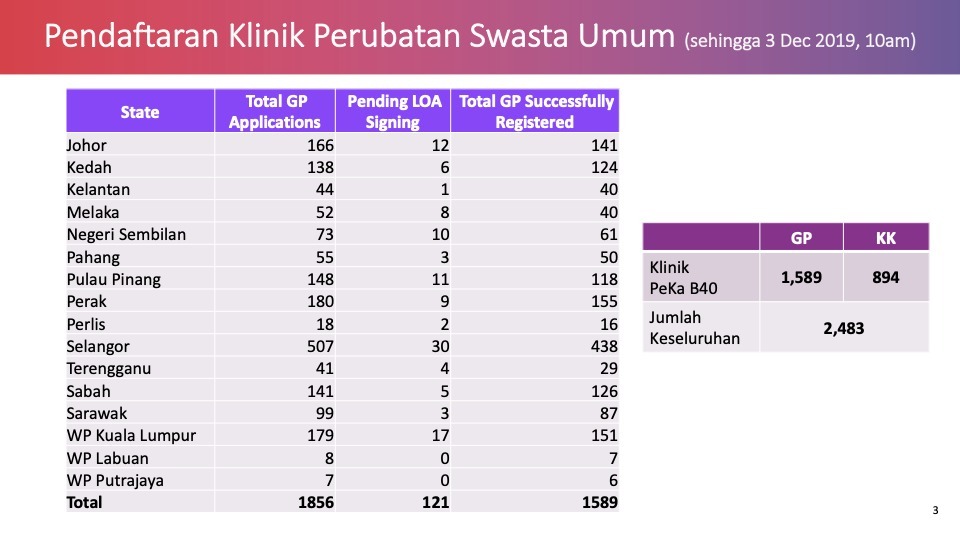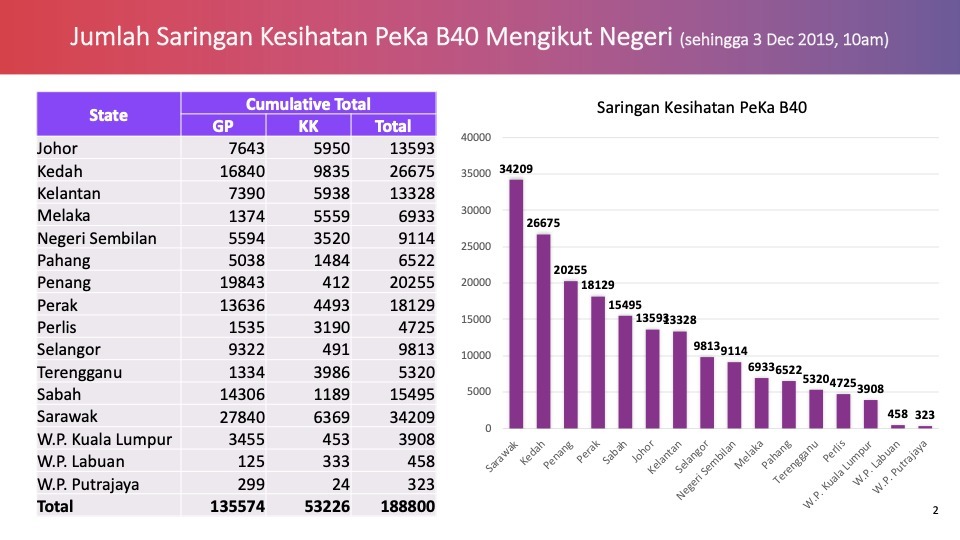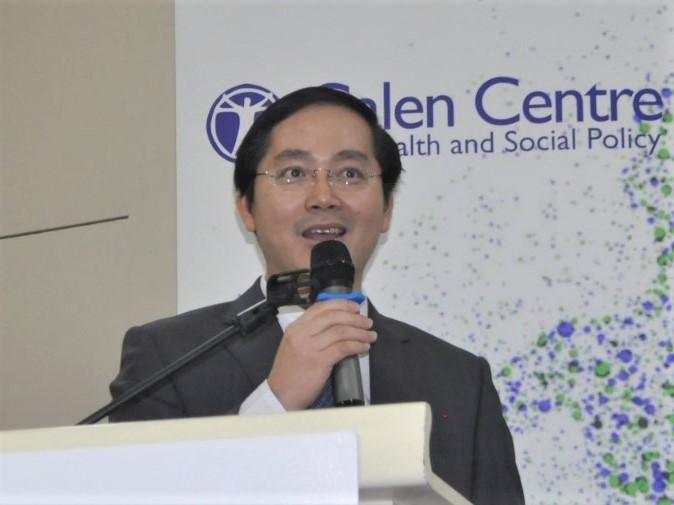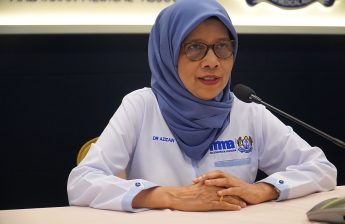KUCHING, Jan 8 — Talks are underway for private general practitioners (GPs) to receive higher pay from the Peka B40 government programme to offer free health screenings.
Dr Liew Shan Fap, president of the Sarawak chapter of the Federation of Private Medical Practitioners’ Association, said this is because, nationwide, the existing pay for GPs who join the Ministry of Health (MOH) health screening programme is low.
Health Minister Dzulkefly Ahmad said last March that the government will pay GPs RM40 for patients’ first visit to conduct a health screening and RM20 for the follow-up visit, claiming, at the time, that almost 95 per cent of GPs “don’t have a problem” with the payment.
If patients require treatment when their screenings pick up problems, Peka B40 doesn’t cover the cost of treatment in the private clinics as GPs are instead told to refer their patients to public facilities.
“I think, principally, we support it because it benefits the people in the B40 group; people need health screening,” Dr Liew told a recent East Malaysian health care-centric conference here organised by the Galen Centre for Health and Social Policy.
He added that GPs in Sarawak, generally, want to help the poor.
Dr Liew said this is perhaps why Sarawak has recorded the highest number of health screenings for Peka B40 patients in all states, according to data from early this month — some 27,840 screenings were offered by GPs in the state, and 6,369 screening by public health clinics, bringing the total figure to 34,209, almost 10,000 higher than the next state in the line-up.
“But we are still negotiating getting better payments for the GPs,” said Dr Liew, citing tedious and unclear processes in the Peka B40 health screening programme that have been criticised by many quarters and stakeholders since the MOH low-income aid programme was launched last April.

According to MOH, 1,589 private GPs were registered with Peka B40 as of last December 3. Selangor recorded the highest number of GP applications to join the programme at 507, followed by Perak (180), and Kuala Lumpur (179).
CodeBlue previously reported that doctors’ forms for Peka B40 patients are seven pages long, comprising questions on the patient’s race, religion, education level, work status, address, phone number, social media platform, medical history involving 12 diseases, family history of 11 conditions, tobacco use, alcohol consumption, physical activity, physical condition of various body parts, and data from rectal and breast examinations.
Despite this, Galen Centre for Health and Social Policy CEO Azrul Mohd Khalib told the conference it was inspiring to note the uptake in the number of GPs joining the Peka B40 programme, quipping that it seemed almost like “national service”.
The Peka B40 scheme aims to reduce non-communicable diseases in the low-income group. Eligible recipients who are aged 50 years and above — some 800,000 Malaysians — are required to undergo a health screening to identify the types of diseases, treatments and medical devices that they can receive. The age limit will reduce to 40 beginning next year, covering an estimated 1.27 million individuals.
Free health screenings include mental health, breast and prostate clinical examinations — if needed — while laboratory examinations include blood and urine tests for diabetes, cholesterol levels and kidney function.
Peka B40 also provides a transport cash incentive of RM500 and RM1,000 respectively for travel to MOH hospitals in the peninsula and East Malaysia, as well as RM1,000 cash for cancer patients to complete treatment at MOH hospitals. In Budget 2019, the government allocated an initial sum of RM100 million for the scheme.

According to MOH data, Sarawak, Kedah, Penang, Perak and Sabah are the top five states with the most number of health screenings in the country for the Peka B40 group. As of December 3, the figures are 26,675, 20,255, 18,129, and 15,495, for Kedah, Penang, Perak, and Sabah, respectively. The figures include screenings by GPs and government health clinics.
The number of health screenings provided for Peka B40 patients in the other states are: Johor (13,593); Kelantan (13,328), Selangor (9,813), Negri Sembilan (9,114), Melaka, (6,933), Pahang (6,522), Terengganu (5,320), Perlis (4,725), Kuala Lumpur (3,908), Labuan (458), and Putrajaya (323).
Bandar Kuching MP Dr Kelvin Yii, a prominent health care advocate here who also attended the conference, said the reason for the large number of Peka B40 screenings in Sarawak is because the state had the highest number of recipients in the country under the Bantuan Sara Hidup (BSH) scheme that was implemented by the previous Barisan Nasional government. The BSH system identifies who is B40, or the bottom 40 per cent of income earners, in Malaysia.
“The uptake is not (according) to our target, but in general, any new policy, people’s awareness needs to be built,” added Dr Yii. “So, we are expecting more and more uptake in the next few years, especially once people get to know about it.
“Some, especially in Sarawak, they are poor, but they’re not registered under the database of BSH, and now that is why we are sending out a lot of means out to register them on the street.”








